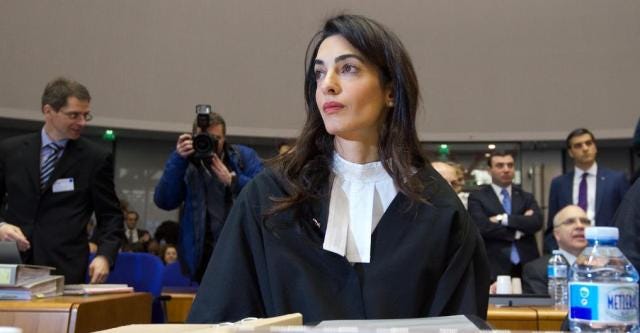Clooney Moves To Close UK War Crimes Loophole
Russian generals committing war crimes in Ukraine can't be tried in the UK. Soon that may change.
Most countries have laws sealing out any possibility that people with outstanding international arrest warrants against them—for war crimes, genocide, and crimes against human humanity—may enjoy safe haven within their borders. The very few countries whose laws do not allow the state to prosecute international human rights warrants effectively offer immunity to perpetrators of the worst of all crimes.
The UK is one of the countries that has no legal way to arrest such people. International human rights lawyer Amal Clooney wants UK laws reformed to prevent Russian war criminals and perpetrators of genocide entering the UK to avoid prosecution.
Currently, the UK’s International Criminal Court Act of 2001 applies only to such crimes if they are committed in England or Wales, or outside the UK by a UK national, a UK resident or a person subject to UK service jurisdiction.
There is just one exception in this law: UK courts may try cases involving torture, regardless of the suspect’s or the victim’s nationality or residence. Clooney wants the law expanded to include genocide, crimes against humanity and war crimes.
To this end, SNP MP Brendan O’Hara has introduced The Universal Jurisdiction (Extension) Bill in the House of Commons. The bill, which O’Hara drafted in close cooperation with Clooney, includes a provision that neither the accused person nor the victim would need to have a specific connection to the UK. Ms. Clooney told the PA news agency:
National courts around the world can put war criminals on trial. But in the UK genocide, crimes against humanity and war crimes can only be prosecuted if the suspect is a resident or national of the UK. And only two trials for international crimes have resulted in convictions. It is time to reform our laws so that Russian war criminals can be arrested at Heathrow—and perpetrators of genocide know there is no safe haven on UK shores.”
The Clooney Foundation for Justice and Redress, co-founded by Amal and husband George Clooney, is expected to release a substantial legal brief on the issue later this year. Referencing the coming report, Mr. O’Hara told MPs:
In short, this Universal Jurisdiction (Extension) Bill is about saying to the world’s worst criminals that there is no hiding place and there will be no immunity. As the Clooney Foundation for Justice report will set out, our courts already have universal jurisdiction when it comes to torture and certain other crimes which can be prosecuted regardless of the defendant’s nationality.
He added:
So, there is no convincing explanation for the distinction that’s drawn between the law on torture and those other international crimes. And, as they say, one consequence of this loophole could well be that Russian generals with blood on their hands could potentially still travel to the UK, go shopping in Knightsbridge, undergo medical treatment and dine out in London’s best restaurants without facing the risk of arrest for the most serious and heinous crimes in the world.
Amal Clooney studied law at St Hugh’s College, Oxford, at NYU. She married actor George Clooney in 2014, and their first philanthropic act as a couple was donating the profits from their wedding photos to their foundation.
Clooney worked as an advisor to Kofi Annan for a United Nations commission on Syria and on a study on the use of drones in counter-terrorist activities. In 2015, she submitted evidence to the European Court of Human Rights that secured investigative journalist Khadija Ismayilova’s release from prison. She represented Nobel Peace Prize laureate Nadia Murad in her landmark case against the Islamic State for mass rape, sex-trafficking and genocide.


